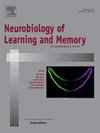海马中退化无关的线性多泛素的增加增强了年轻成年大鼠的记忆,而不是老年大鼠
IF 1.8
4区 心理学
Q3 BEHAVIORAL SCIENCES
引用次数: 0
摘要
与年龄相关的记忆丧失影响着65岁以后世界上大约40%的人口,是痴呆症和阿尔茨海默病(AD)发展的一个重要危险因素。大量研究表明,在生命的后期,泛素-蛋白酶体系统的功能会下降,泛素-蛋白酶体系统是细胞中蛋白质降解的主要调节因子,也与记忆的形成密切相关。然而,泛素可以标记蛋白质的命运,而不是被蛋白酶体破坏。重要的是,我们仍然不知道衰老过程是如何改变蛋白酶体独立形式的泛素化,以及这如何导致与年龄相关的记忆丧失。在这里,使用无偏倚的蛋白质组学方法,我们发现线性多泛素化——唯一非赖氨酸蛋白酶体独立的多泛素化形式——在静止的老年海马中比年轻人显著增加。然而,在学习的反应中,老年海马的线性多泛素化显著减少,与学习后年轻成年动物的线性多泛素化增加形成对比。CRISPR-dCas9介导的海马线性多泛素化上调改善了年轻成年大鼠的记忆,但没有改善老年大鼠的记忆。总之,这些数据表明,尽管线性多泛素化是海马体依赖性记忆的关键调节因子,但在老年海马体中增加线性多泛素化并不足以改善老年人的记忆。这些发现促进了我们对生命后期调节记忆的分子机制的理解,并刺激了未来对降解无关泛素化在这一过程中的作用的研究。本文章由计算机程序翻译,如有差异,请以英文原文为准。
Increasing degradation-independent linear polyubiquitin in the hippocampus enhances memory in young adult but not aged rats
Age-related memory loss affects approximately 40% of the world’s population after the age of 65 and is a significant risk factor for the development of dementia and Alzheimer’s Disease (AD). Numerous studies have reported that late in life there decreases in the function of the ubiquitin–proteasome system, the main regulator of protein degradation in cells that is also critically involved in memory formation. However, ubiquitin can mark proteins for fates other than destruction by the proteasome. Importantly, it remains unknown how the aging process alters proteasome-independent forms of ubiquitination and how this could contribute to age-related memory loss. Here, using an unbiased proteomic approach, we found that linear polyubiquitination – the only non-lysine proteasome-independent form of polyubiquitination – is significantly increased in the aged hippocampus at rest relative to young adults. However, in response to learning there was a significant reduction in linear polyubiquitination in the aged hippocampus, which contrasted with increases seen in young adult animals following learning. CRISPR-dCas9 mediated upregulation of linear polyubiquitination in the hippocampus improved memory in young adult, but not aged, rats. Together, these data suggest that while linear polyubiquitination is a critical regulator of hippocampus-dependent memory, increasing it in the aged hippocampus is not sufficient to improve memory in advanced age. These findings advance our understanding of the molecular mechanisms regulating memory late in life and stimulate future research on the role of degradation-independent ubiquitination in this process.
求助全文
通过发布文献求助,成功后即可免费获取论文全文。
去求助
来源期刊
CiteScore
5.10
自引率
7.40%
发文量
77
审稿时长
12.6 weeks
期刊介绍:
Neurobiology of Learning and Memory publishes articles examining the neurobiological mechanisms underlying learning and memory at all levels of analysis ranging from molecular biology to synaptic and neural plasticity and behavior. We are especially interested in manuscripts that examine the neural circuits and molecular mechanisms underlying learning, memory and plasticity in both experimental animals and human subjects.

 求助内容:
求助内容: 应助结果提醒方式:
应助结果提醒方式:


